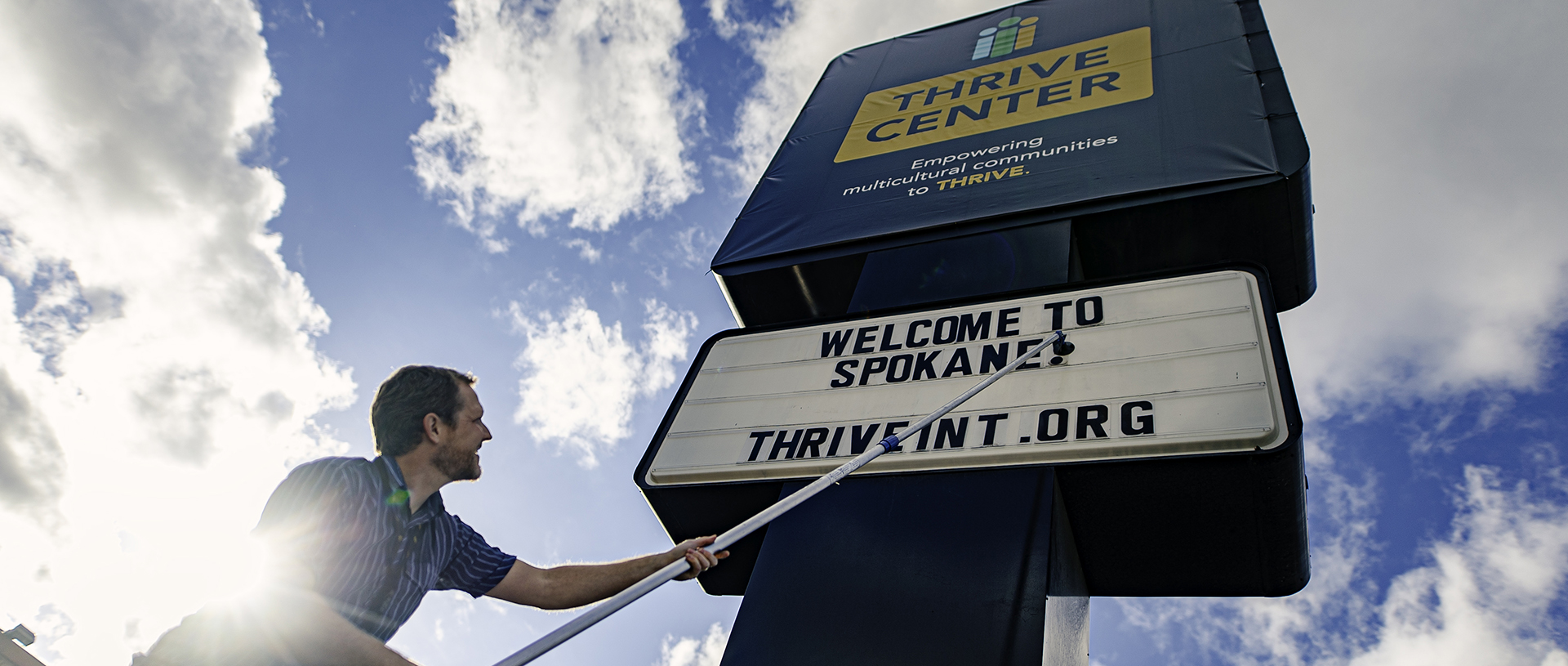
Shortly after Mark Finney (MDiv ’08, PhD ’17) began working as a refugee resettlement specialist in Spokane, Washington in 2016, the director of his office left unexpectedly. This happened right as hundreds of new refugees were arriving in the area, terrified by the anti-Muslim and anti-refugee rhetoric they were hearing from the highest offices of the US government. “We need to do something,” Mark thought. He wanted to show refugees that they were safe and welcome in the community. So, he called people he knew in ministry and gathered a group of several dozen local pastors. Just one week later, Mark tells me, “Over a thousand people gathered at Gonzaga University,” rallying to stand in solidarity with refugees.
Mark describes the moment as a “huge milestone in the history of our community.” He explains that welcoming refugees is good both for the refugees and also for the preexisting community that welcomes them. “When the immigrants in a community thrive,” Mark reflects, “it spills over.” Refugees have so much to add to the communities they join, and Mark wants to see them empowered to thrive in their new homes. He wants refugees to be able to “buy a home, send their kids to college, start their own businesses, bring their food, bring their culture, bring their ideas, make this place better.”
This vision of refugees’ holistic thriving, interconnected with the thriving of the broader community, led Mark in 2021 to found Thrive International—a local Spokane-based nonprofit serving refugees. Their motto: Together, we thrive.
Raised in Coeur d’Alene, Idaho—as a white kid growing up in a rural, predominantly white community and a public high school graduating class of 19 students—Mark did not always have a passion for building multicultural communities centered on refugees’ thriving. It is a calling that has taken shape over many years—and particularly through his experiences
at Fuller.
While Mark and his wife were studying at Fuller, they lived for six years in a mostly Hispanic neighborhood in Northeast Pasadena, in Fuller’s Madison Square intentional community. Their neighbors were fellow Fuller students from Korea, China, and the Central African Republic. “It really was a microcosm,” Mark reflects, “of the whole planet and the whole kingdom of God.” This experience of multicultural community was deeply formative for Mark. “It shaped me,” he says, “to think about things in a much broader perspective than what I inherited growing up in rural white America.”
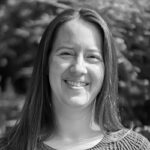
Liz Cooledge Jenkins is a Seattle-based writer and the author of Nice Churchy Patriarchy: Reclaiming Women’s Humanity from Evangelicalism.
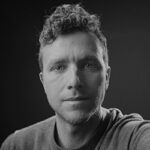
John Harrison is a documentary filmmaker and photographer based in Spokane, Washington. See more of his work at blueskyhill.com.
Shortly after Mark Finney (MDiv ’08, PhD ’17) began working as a refugee resettlement specialist in Spokane, Washington in 2016, the director of his office left unexpectedly. This happened right as hundreds of new refugees were arriving in the area, terrified by the anti-Muslim and anti-refugee rhetoric they were hearing from the highest offices of the US government. “We need to do something,” Mark thought. He wanted to show refugees that they were safe and welcome in the community. So, he called people he knew in ministry and gathered a group of several dozen local pastors. Just one week later, Mark tells me, “Over a thousand people gathered at Gonzaga University,” rallying to stand in solidarity with refugees.
Mark describes the moment as a “huge milestone in the history of our community.” He explains that welcoming refugees is good both for the refugees and also for the preexisting community that welcomes them. “When the immigrants in a community thrive,” Mark reflects, “it spills over.” Refugees have so much to add to the communities they join, and Mark wants to see them empowered to thrive in their new homes. He wants refugees to be able to “buy a home, send their kids to college, start their own businesses, bring their food, bring their culture, bring their ideas, make this place better.”
This vision of refugees’ holistic thriving, interconnected with the thriving of the broader community, led Mark in 2021 to found Thrive International—a local Spokane-based nonprofit serving refugees. Their motto: Together, we thrive.
Raised in Coeur d’Alene, Idaho—as a white kid growing up in a rural, predominantly white community and a public high school graduating class of 19 students—Mark did not always have a passion for building multicultural communities centered on refugees’ thriving. It is a calling that has taken shape over many years—and particularly through his experiences
at Fuller.
While Mark and his wife were studying at Fuller, they lived for six years in a mostly Hispanic neighborhood in Northeast Pasadena, in Fuller’s Madison Square intentional community. Their neighbors were fellow Fuller students from Korea, China, and the Central African Republic. “It really was a microcosm,” Mark reflects, “of the whole planet and the whole kingdom of God.” This experience of multicultural community was deeply formative for Mark. “It shaped me,” he says, “to think about things in a much broader perspective than what I inherited growing up in rural white America.”
Liz Cooledge Jenkins is a Seattle-based writer and the author of Nice Churchy Patriarchy: Reclaiming Women’s Humanity from Evangelicalism.
John Harrison is a documentary filmmaker and photographer based in Spokane, Washington. See more of his work at blueskyhill.com.
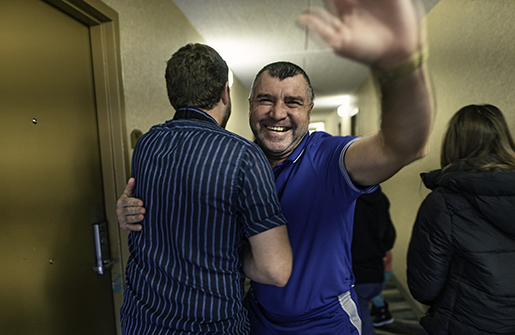

After graduating with his MDiv in 2008, Mark was awarded the Parish Pulpit Fellowship and spent a year in Thailand serving alongside missionaries who were doing holistic justice work. During this time, he served as an interim pastor for a bilingual church composed of people who spoke eight different first languages. “The church met in a hotel banquet room in the heart of a huge red light district, worshiping Jesus together in an incredible multicultural community.” It was “pretty unconventional,” he says—and “a beautiful place to see God’s Spirit at work.”
Mark kept these experiences in mind when he and his family moved to Spokane a few years later. Newly arrived in the area, he “prayed and looked around at the needs in the city,” and he saw that “not many churches were intentionally multicultural or multilingual communities.” This was the kind of community he wanted to be a part of, the kind he wanted to help build. He worked briefly as a church planter and then for several years in refugee resettlement at a large, national Christian humanitarian organization before he finally founded Thrive.
From its very beginnings, Thrive has stretched and deepened Mark’s faith—often in unexpected ways. When Mark first set out, he imagined he would found a faith-based organization. After all, his background was in Christian ministry, Christian seminary education, and Christian nonprofit leadership, and his faith was the reason he wanted to help welcome refugees into the local community. But then he sought guidance from several mentors—particularly people who had been refugees themselves.
One former refugee told him this: “Christianity works best not when it’s endorsed by an organization but when it’s embodied by people.” This woman helped Mark understand that “for people who’ve been traumatized, excluded, or oppressed, they’re very, very sensitive to any other forms of oppression or injustice.” Refugees might be suspicious of a religious organization’s motives. “They’ll be wondering,” she said, “if you’re serving them because you care or because you’re trying to make an impression for them to join you.”
This conversation surfaced profound questions for Mark. As he considered whether to start a faith-based nonprofit or a secular one, he wondered, “What works best as a witness for the gospel?” and, “Which approach requires me to operate with the most faith?”
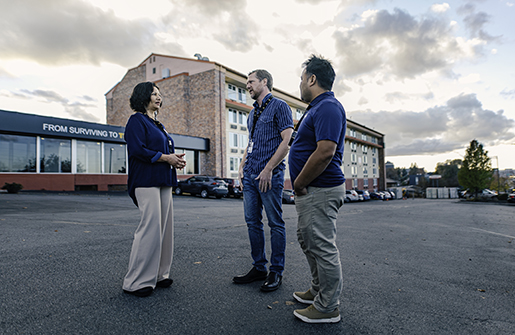

Mark realized he didn’t need staff to share his faith commitments or sign off on any particular belief statements. He didn’t need to try to control the future direction of the organization. He says, “I needed to start something and trust that if it’s God’s work, then God can maintain it.”
Thrive’s work focuses on three areas: housing, programs for women, and programs for youth. These were the most pressing needs Mark saw among refugees who recently arrived in the Spokane area.
Around the time Mark was starting Thrive, Russia invaded Ukraine, displacing millions of people. And the need for affordable housing for refugees was enormous. Mark knew the owners of a hotel that had closed down, and Thrive quickly repurposed the fully furnished building to house about two hundred refugees. This became the Thrive Center, a “combination of transitional affordable housing and a multicultural community center.”
Some days at the Thrive Center, there is on-site health care. Other days, local public libraries come in and offer educational programs. On Fridays, a volunteer teaches a Zumba class for women. Thrive also partners with the local YMCA to offer free gym access for youth every Thursday night, and they partner with a nearby church that lets them use their parking lot for driving classes for women.
Through all of these services, the goal is to build thriving multicultural communities. Mark wants to help refugees “see themselves as part of a story of flourishing and hope,” and he wants to help non-refugees see their communities and cities as “stories of diversity, community, and interdependence.” As we reshape the stories we tell ourselves, he says, we reshape our communities.
In this work of reshaping stories, Mark’s role is often that of a listener. “I try really hard to make sure that, as a leader, the thing I do best is listen,” he says. “There are so many things I don’t know and don’t understand.” As a self-described “white guy in a multicultural space,” Mark tells me, he is always learning, always seeking to empower others to take the lead. He says, “I have to make sure the folks who best understand the situations are the ones making the decisions.”
Mark loves that much of his work involves supporting a deeply multicultural team. Thrive’s women’s programs, for example, are staffed by two women who are refugees themselves. And Thrive’s youth program leader came to the US as a teenage refugee from South Sudan many years ago. The youth leader’s passion for his work comes from his own refugee experience; he remembers what made life difficult in a new place, and he wants to make that experience better for others. At Thrive, he gets to do exactly that—for hundreds of other teens in the position he was once in. Mark feels honored to be able to support these leaders in their work.
Ultimately, through the affordable housing, women’s programs, and youth programs that Thrive offers, Mark hopes to see refugees empowered. He wants to see them have space to be creative. “God is a creator,” Mark explains, and since humans reflect God’s image, we are meant to be creators too. “Whether art or music or business or agriculture,” Mark continues, “whatever it is, we are meant to be generative.” In Mark’s vision of human flourishing, creativity overflows in abundance. “Creators make enough to share,” he says. “Jesus always had leftovers.”
Mark finds himself thinking often of Jeremiah 29, written to God’s people during exile. “They are refugees in their day,” Mark tells me, “struggling with being oppressed in a foreign culture.” Even in this context—perhaps especially in this context—God doesn’t just want them to survive; God wants them to thrive. God says, as Mark paraphrases it, “I want you to build homes, plant gardens, get married, have kids—I want you to thrive and seek the thriving of the city to which you are called. Because if it thrives, you will thrive too.”
To Mark, this is what it means to seek the shalom of his city (Jer 29:7). Without refugees and other immigrants thriving, he says, “we cannot achieve our fullness as a community.” Mark’s nonprofit is not an explicitly faith-based organization, but his work, and his approach to it, is deeply formed by his belief in a God who wants us all to flourish. From Pasadena to Thailand to Spokane, Mark has seen—and believes—that, together, we thrive.
As she provides therapy for her clients and creates resources on mental health, psychologist Jessica Smedley forms safe and empowering spaces for the Black community.